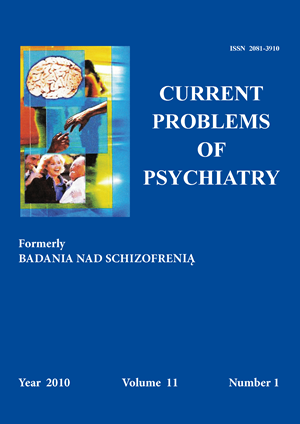Between Cultural Phenomenon and Mental DisorderThe Social Withdrawal in Japan
Słowa kluczowe:
social withdrawal, cultural phenomenon, JapanAbstrakt
The main purpose of this article is not to raise some transient interest in the mysterious issue of social withdrawal in Japan. The explicit mission expressed in this text is to reveal significant affiliations or rather deep inveteracy, or, better still, enracinement of psychiatry in culture, with special attention to the realm of ethics and the context of values. The unique phenomena of mental (social) crises within a certain society (culture) are the litmus paper or rather the touchstone of transitions of values’ hierarchy in the culture.
Bibliografia
1. Murakami R. Japan’s lost generation. “Time”, 1 May 2000, P. REES, Japan: The Missing Million, Sunday 20 October 2002 on BBC Two and similar news.
2. Kawakami N. Kokorono kenkomondai to taisakukiban no jittai ni kannsuru kenkyu, (Researching concerning the mental problem and the actual condition of treatment), In: „The report of Ministry of Health, Labour and Welfare”, 2002, p. 6. http://mental.m.utokyo.ac.jp/h14tokubetsu/総括研究報告書.pdf
3. http://www8.cao.go.jp/monitor/answer/h15/ans1508-004.html
4. Nakanishi T., Nihonbunmei no kohai: Ima kiro ni tatsu kono
kuni, (History of Civilization of nation: Japan has a civilized power to overcome crisis). Fusousha, Tokyo; 2003.
5. Shishunki, Seinenki no futoukou to hikikomori: Rikai no shikata, taiou no shikata (Toko-kyohi and Hikikomori among the youth: Understanding and treatment), In: “The report of Mental health care center in Tama city of Tokyo prefecture”, Coloni, Tama 2003.
6. 10dai, 20dai o chushin toshita Hikikomori o meguru chiikisei-shinhokenkatsudou no gaidorain (The Guideline of regional activity of mental health care dealt with Hikikomori How to assist patients and deal with Hikikomori issue at the level of health facilities). http://www.mhlw.go.jp/topics/2003/07/tp0728-1.html
7. Isobe U. Hikikomori ga naoru toki: 23 nin no rinshourei, (Recovery from Hikikomori: the clinical case of 23 patients). Koudansha, Tokyo 2004, p. 20.
8. Saito T. Shakaiteki Hikikomori: Owaranai seishun (Social withdrawal: Everlasting adolescence), PHP Institute, Tokyo; 1998, p. 25.
9. Isobe U. Hikikomori ga naoru toki: 23 nin no rinshourei, (Recovery from Hikikomori: the clinical case of 23 patients). Koudansha, Tokyo; 2004, 22-27.
10. Yamada H. Wakomono tachi no shakaiteki hikikomori (Social withdrawal of youngsters: how should parents and families deal with this issue?). Nihon Kajo shuppan, Tokyo; 2001, p. 2.
11. Ushijima S. Jinkaku no byouri to seishinryouhou (Pathology of character and a method of mental treatment), Kongoushuppan, Tokyo 2004, s. 156.
12. Sakai M. et all. Hikikomori no jittai ni kansuru chousahou-kokusho (The Researching report concerning the actual conditions of Hikimokori). The Actual condition by the National Hikikomori Parental Association KHJ-NPO Juridical Person. Vol. 2, 2005, p. 10.
13. Kondo N., Hasegawa T. Hikikomori no rikai to enjo (Understanding and Assistance for Hikikomori). Hobunsha: Tokyo; 1999, p. 11.
14. Markus H.R., Kitayama S. Culture and the Self: Implications for Cognition, Emotion, and Motivation. “Psychological Review”, 1991; 98/2: 224-253.
15. Myianaga K. The Creative Edge. Emerging Individualism in Japan. New Brunswick, NJ: Transaction Books; 1991, p. 91.
16. If you think Hikikomori…? The pamphlet for you and your family. The Ministry of Health; Labour and Welfare: 2002, pp. 2-3.
17. http://www.hikikomori-tokyo.jp/whats/index.php
18. Takasuka Y. Hikikomori shinnri tojikomoru shinri: Jiritsu-shakai no otoshiana. (The psychology of Hikikomori and withdrawing: The trap of self-independent society). Tokyo; Gakubo-shohou: 2002, pp. 21-24.
19. Kato H. Hikikomori no shinri, Meisousuru wakamono no aidentiti: Furita, Parasaito shinguru, niito, Hikikomori (Psychology of Hikikomori. The Mediation of youth identity: Freeter, Parasite-single, Neet, Hikikomori, ed. T. Shirai, Tokyo; Yumani-shohou: 2005, pp. 189-213.


